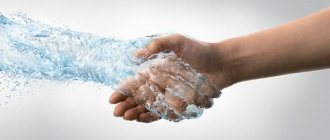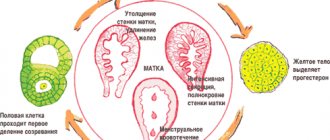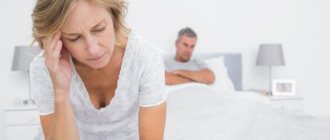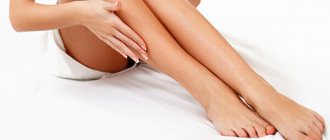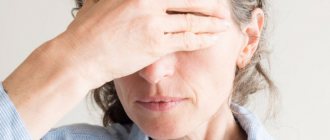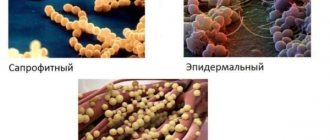Sweating at night in women during menopause. Menopause, menopause.
Sweating during menopause
During menopause, a woman may notice that she has increased sweating, which is common during menopause.
Hot flashes and sweating during menopause are expressed in a feeling of intense heat in the upper body, redness of the face and neck. The skin quickly becomes moist. However, the woman's body temperature remains unchanged. The frequency and duration of hot flashes in each individual case is individual. But a woman may not necessarily notice the presence of sweating and hot flashes during menopause. Some women (for example, obese women) may not experience hot flashes at all, while thin women have a fairly large number of hot flashes during the day. 20% of women report having hot flashes for five years or more.
Night sweats during menopause
During the night, a woman may experience increased sweating during menopause. If she is a light sleeper, she may wake up with this symptom. Sleep disturbances are often associated with hot flashes. Because the woman has already woken up, experienced an attack and then cannot sleep for a long time. As a result, in the morning she feels weak and tired.
Sometimes sweating reaches such a degree that you have to change your bed linen.
However, with a sufficiently strong sleep, she may not notice any changes in the body and continue to sleep until the morning. And then in the morning hours a woman may feel weak.
How to reduce sweating during menopause?
- To reduce the likelihood of hot flashes, you need to review your diet and include as many vegetables as possible. It is known that vegetarians suffer from hot flashes less often.
- Green tea will help release toxins and have a diuretic effect.
- You should minimize the consumption of alcoholic beverages and the consumption of spicy foods. You should not eat very hot food, as this can provoke another flush and sweating.
- To maintain strength, it is important to take a multivitamin complex.
- It is advisable to use homeopathic medicines (sepia, lachesis, pulsatilla).
A woman should remember that heavy sweating during menopause is a natural physiological process that is necessary to remove harmful toxins from the body and regulate body temperature. It is important to take your condition for granted and try to adjust your usual lifestyle.
Night sweats in women: causes
A woman, unlike a man, goes through a period of hormonal changes in the body several times during her life, this is the course of pregnancy and the completion of the birth cycle - menopause.
Often, night sweats in women are directly related to changes in the body during pregnancy. From the moment the egg is fertilized until the birth of the child, the secretion of the sebaceous and sweat glands increases in a woman. The need for fluid increases, the excess of which is released naturally, including through the skin. The volume of circulating blood in a pregnant woman also increases, and flushing of the skin occurs, which causes sweating
Night sweats in women during menopause
Between the ages of forty and fifty, women experience menopause. The work of the ovaries and the activity of the uterus fades away. This period is also called menopause; menopause can last from two to ten years, it all depends on the general state of health.
During menopause, women experience severe night sweats, frequent hot flashes, fever, and increased blood pressure. As a rule, in people with unstable mental health, who do not engage in physical activity, and who are overweight, menopause lasts much longer and is more debilitating.
These are natural causes and do not require drug treatment. As a rule, the body copes on its own, you just need to carefully monitor the symptoms and not miss serious disorders in the body.
Sweating as a consequence of the disease
Very often, sweating occurs as a consequence of some disease. If sweating is not periodic, but has become constant, you should think about whether everything is okay with your health.
- Diabetics usually take pills or insulin at night that lower blood sugar; a sharp drop in sugar may be the cause of night sweats. Strict selection of the dose of the drug, as well as following a diet, helps bring sugar back to normal.
- Pre-stroke condition, stroke, hypertension, provoke night sweats in women. Many medications taken for these diseases increase sweating, and with high blood pressure, hot flashes are common.
- Particular attention should be paid to tuberculosis. Signs of tuberculosis are general weakness and sticky sweat, fever.
- If there are problems with the thyroid gland, then there is nervousness. People with nervous diseases tend to sweat frequently.
If there is reason to suspect any disease, you should immediately consult a doctor.
When to see a doctor?
If menopause is an inevitable but natural process, then sweating, regardless of age, is an alarming symptom. And if you are barely over 40, you may be mistaken and confuse hot flashes and hyperhidrosis.
Excessive sweating can be a symptom of many unpleasant diseases:
- diabetes;
- damage to the nervous system;
- infections;
- hyper- or hypofunction of the thyroid gland;
- cardiovascular diseases;
- vegetative-vascular dystonia;
- and even cancer.
Too frequent and severe bouts of sweating, which literally poison your life, can also be a reason to consult a doctor.
Are you worried about sweating during menopause?
Menopause... Menopause... Hormonal changes in women.. Cessation of reproductive activity.. Sweating during menopause... Words and definitions, it would seem, are all different, but they have the same meaning: the woman has reached a period of decreased sexual function.
There are early menopause (occurring before the age of 40), timely (45-55 years) and late (after 55 years). As a rule, a woman’s well-being in any menopausal period is characterized as severe, unbearable, painful. This continues for several years, “signaling” the aging of the body. This process is accompanied by the following problems:
- physiological (decreased sexual function, sleep disturbance and insomnia at night coupled with daytime drowsiness, joint pain, skin aging accompanied by the appearance of wrinkles);
- psychological (depression, fatigue, sudden mood swings, changes in character, increased irritability, sensitivity, sometimes even suspiciousness, seemingly causeless anxiety, inexplicable weakness, nervousness);
- a hormonal explosion that brings sudden hot flashes, changes in blood pressure, pulse surges and, as an external manifestation of all of the above, increased sweating.
I sweat a lot during menopause, why and what to do
What to do if you suffer from sweating during menopause? This question worries many women, because this condition causes a lot of inconvenience, interferes with communication, causes colds and insomnia, and also makes you nervous when you want to remain calm. But this is not a reason to be upset.
Any doctor will tell you that increased sweating during menopause is a temporary phenomenon that does not always require special treatment.
Overview of the reasons for the appearance
During menopause, the entire functioning of a woman's reproductive system is restructured, and this is just part of a whole process controlled by sex hormones.
Changes in hormone levels
A gradual decrease in the amount of estrogen and uneven changes in their level in the blood cannot but affect the female body. Certain areas of the central and peripheral nervous system begin to perform their functions differently. The pituitary gland and ovaries, which previously produce hormones in the required volume, with the onset of menopause begin to produce them in much smaller quantities and unevenly. All this affects the work of the sweat glands, which begin to function differently.
Overheating of the body
Sweating during menopause can occur in women due to normal overheating of the body and is not a sign of any pathology or malfunction. A stuffy room, heat, tight clothing and even a warm blanket can lead to the body being unable to cool down and overheating. Sometimes overheating is accompanied by increased blood pressure and severe anxiety.
Nervous system malfunctions
Increased emotions are especially common during menopause. Uncontrolled aggression, unreasonable irritability, tearfulness, and touchiness may be present, which provoke the activity of the sweat glands, resulting in a large volume of liquid appearing on the skin.
Excess weight
In addition, many women at the time of menopause are overweight, which can cause a disease such as hyperhidrosis. To perform even a small physical warm-up, a woman will need to make more effort at this time. The result of this is increased sweating.
Problems from excessive sweating
Although sweating is not the most unpleasant sign of a woman’s new condition, the appearance of a large amount of sweat creates a lot of problems for her:
- The smell of sweat interferes with communication with people and has an irritating effect on the woman herself. It is almost impossible to kill it with any deodorant.
- Itching, appearance of rashes on the skin. The affected areas of the body not only lose their tone, but also become susceptible to various rashes.
- Sleep disturbance and insomnia, which contributes to the exacerbation of all other signs of menopause. Profuse night sweats exhaust a woman, forcing her to get out of bed several times to wash and change bed linen.
- Frequent colds that occur due to decreased immunity. A sweaty woman catches viruses much easier and more often.
Tips to reduce sweating
Many women complain that they sweat a lot during menopause, but they don’t know what to do and are embarrassed to see a doctor about this. Is there a magic pill that can fix this problem?
To get rid of excessive sweating during menopause, it is necessary, first of all, to change your lifestyle, reconsider your own habits and, if possible, eliminate the external causes of increased sweating.
To do this, you need to move more. Swimming, cycling, gymnastics and brisk walking are great options. Exercising will put your hormonal balance in order and increase the level of internal endorphins, after which stress and insomnia will gradually disappear. Hot flashes will appear much less frequently, which will lead to a decrease in sweating.
It is recommended to avoid unhealthy foods and drinks that irritate the nervous system. You need to add more fiber to your diet. They will help saturate the body with essential vitamins and minerals.
You should control your weight. If you have extra pounds, weight loss should occur gradually. You can't go hungry. Some women experience weight loss during menopause. You should wear clothes appropriate for the weather and they should be loose. It is better to give preference to natural fabrics. You need to take a complex of vitamins, as they can improve hormonal levels.
You should try not to visit stuffy rooms, and ventilate your room as often as possible, especially before going to bed at night.
It is better to quit smoking, since nicotine has a very bad effect on blood vessels, and they, in turn, affect the functioning of the brain, central nervous system and sweat glands. Hot flashes, which cause menopausal sweating and hyperhidrosis, most often plague women who smoke.
Folk remedies to combat sweating
Folk remedies can help combat excessive sweating, especially if used in combination with lifestyle changes. But before using them, you should definitely consult a doctor, since some herbs can have a negative effect on the level of female hormones and even cause an allergic reaction.
Simple and effective folk recipes may include the following herbal teas:
- Tea with linden blossom, lemon balm and mint has a calming effect and eliminates the causes of excessive sweating.
- Sage infusion. This drink suppresses the activity of the sweat glands and calms the nervous system.
- Decoction of oak bark or chamomile. Oak bark will help reduce sweating, and chamomile will soothe and have an antibacterial effect.
- A collection of clover, blueberries, sage, as well as marsh cudweed.
Drug treatment
If excessive sweating is the only thing that bothers you during menopause, then it is better to start treatment first by changing your lifestyle and using traditional recipes. And if they don’t help, then you should switch to drug treatment. It is imperative to visit a gynecologist and endocrinologist.
To eliminate symptoms of menopause, a doctor can prescribe light medications based on natural hormones, so-called phytoestrogens, such as: Qi-Klim, Feminal, Klimadinon, Klimaktoplan. When used regularly, these drugs will help stabilize hormonal balance and eliminate the causes of excessive sweating. They will help with menopause from hot flashes and normalize the psychological mood. The sweat glands will become less active and external factors will no longer be able to influence them.
If women during menopause have not only increased sweating, but also other serious manifestations, then the doctor may prescribe stronger, so-called synthetic estrogens: Estrofem, Ovestin, Proginova, Klimara, Divigel, as well as combined agents. In the most serious cases, more serious hormone replacement therapy is prescribed. However, doctors now rarely prescribe strong medications due to the increased risk of cancer in menopausal women.
Thus, increased sweating during menopause can turn even the most self-confident woman into a notorious hysterical woman. But don’t be upset - there are many ways to get rid of this unpleasant phenomenon. You just need to take a little time and apply force in the fight against hyperhidrosis, and then all its accompanying symptoms will disappear.
swedmed.ru
Sweating during menopause: causes
Excessive sweating during menopause causes a lot of inconvenience, although it can be classified as a phenomenon common to menopause. Excessive sweating (hidrosis) is caused by situations such as: heat outside or stuffy indoors, stress, taking medications, and a certain lifestyle.
Excessive sweating during menopause is a symptom characteristic of 75-85% of women, but its manifestations are quite individual. The frequency and duration of “hot flashes”, the time of their “arrival” (daytime perspiration, night sweats) is a personal tolerance for each individual woman. It all depends on the body's reaction to the heat. By the way, such attacks can occur long (several years!) before the onset of menopause and last up to a decade and a half, “plaguing” a woman, making her life unbearable for herself, and her (the woman) unbearable for relatives and colleagues.
Attacks of sweating during menopause, as a rule, are very sharp and sudden. They are called "tides". The duration of the tides is either several seconds or several minutes, and the intervals between them are 0.5-2 hours. Appearance time is around the clock. External signs are hyperemia (redness of the face), increased sweating, which is accompanied by a feeling of heat, and sometimes even numbness of the hands and fingers, tingling at their tips, as well as tachycardia and, in rare cases, loss of consciousness. The tide ends either with a feeling of chilliness, cold, or chills.
Traditional medicine to help
What folk remedies should you take to reduce sweating during menopause? There are medicinal herbs that can help get rid of a delicate problem.
Facilities:
- Decoctions of chamomile and oak bark are added to the bath. Helps reduce sweat production.
- Rosemary is a wonderful herb for sweating. Thirty grams of rosemary leaves and a glass of water are mixed in a water bath. Heat for twenty minutes. The resulting product is divided into three parts and taken before meals.
- Sage decoction is a good remedy for excessive sweating. Three tablespoons of raw material are poured into a glass of boiling water. Take several times a day.
- Birch buds are poured with vodka. Leave to infuse for three days. The resulting tincture is used to wipe problem areas of the body.
It is quite possible to get rid of excessive sweating with the help of folk remedies.
Sedatives
During menopause, the nervous system of women is especially tense. The lady becomes irritable and nervous. In such a case, it is recommended to pay attention to sedatives that normalize the state of the nervous system.
Medicines:
- Valerian,
- Cliophyte,
- Novo-Passit,
- Persen,
- Afobazol.
Taking such medications will help put the nervous system in order and have a beneficial effect on sleep and quality of life. Many sedative medications help with headaches and heart palpitations. The remedies are prescribed by a specialist.
Hygiene
Hygiene rules are no less important during menopause. Taking a shower every day will cleanse your skin of sweat and dirt. Hair is washed as needed, without bringing it to a dirty state. It is worth paying attention to clothes and bed linen, and changing them as often as possible.
Using a variety of products will add confidence and get rid of unpleasant odors.
Sweating during menopause is a common phenomenon. Most women suffer from a similar problem. The use of a variety of techniques and medications will help cope with hyperhidrosis.
https://youtu.be/gd-WnKVyo0A
Why do tides occur?
Menopause is a special period in a woman’s life. Her body begins to suffer from a lack of the female hormone estrogen. It has a direct effect on the so-called thermoregulatory center located in the hypothalamus in the brain. A decrease in the production of this hormone is perceived by the body as a signal of “overheating”, as a result of which it begins to actively give off heat, expanding peripheral vessels, “including” tachycardia and sweating, which protects the human body from overheating.
A decrease in the level of sex hormones (estrogens) is directly related to the centers of the brain responsible for thermoregulation, that is, to physiology. Therefore, there is no “cure for menopause” and there cannot be. Women cannot get rid of hot flashes and cope with all the manifestations of aging on their own.
You can optimize your general condition by reducing the number of hot flashes per day and “easing” their manifestations. And there is only one piece of advice: consult a doctor who will tell you how to reduce sweating during menopause and prescribe appropriate medications. You can also reduce sweating during menopause using folk remedies.
Features of menopause
Medicine calls three types of menopause:
- early occurs at 35-40 years;
- late begins at 55-65 years;
- average (most common) after 50 years.
The duration of menopause ranges from several months to several years. The main symptom is the cessation of menstruation. The most striking problems are irritability and increased sweating during menopause.
The process of decline of reproductive function is combined with changes in hormonal levels in a woman’s body. The ovaries stop functioning, and the amount of the hormone estrogen decreases. As a result, the woman's thermoregulation is impaired. Most often, age-related hyperhidrosis affects the armpits and face.
What to do to avoid hot flashes?
Hot flashes are not a disease, but a completely adequate reaction of the body to a forced age-related “restructuring”. Aging transfers all vital systems and organs of a woman to a new, unusual “operation mode”. Sweating is a similar reaction to certain external factors, by reducing or avoiding them, you can effectively dull the manifestations of hot flashes and reduce sweating. These factors include:
- being in hot, stuffy rooms or in the open air in the heat;
- close proximity to heat sources such as electric heaters, running hair dryers, dryers and open flames;
- exposure to nervous disorders, stress, the occurrence of situations that cause them;
- drinking hot drinks, drinking alcohol;
- abuse of tobacco products, hookahs;
- abuse of coffee, sugar, fatty, salty, spicy foods;
- wearing clothes made of synthetic fabrics.
General recommendations
During menopause, every woman experiences discomfort, unwanted symptoms, frequent irritability and excessive mood swings. These symptoms cause sweating and nervous breakdowns, which can negatively affect normal life. With the help of frequent rest, light physical activity, and proper nutrition, you can influence the hormonal system.
You can prepare for menopause in advance. From the age of 35 you need to monitor your diet (use more soy and isoflavone preparations in your diet). Also use foods rich in fiber in your diet. Eliminate or reduce the amount of alcohol and tobacco products.
Overweight women are advised to lose weight and wear light clothing made from natural fabrics . At work, you should often ventilate the room, providing yourself with access to fresh air.
Practical recommendations
- How to behave when the tides come?
At the first symptoms of hot flashes, you need to learn to remain calm, not panic, and not be nervous. You can try to “breathe with your stomach”, holding your breath after sighing for 4-6 seconds, which helps to calm down, “quenching” internal “storms”. If possible, open a window or window and go outside into the fresh air. But do not overdo it, drafts and cold piercing winds, while removing the primary symptoms of hydrosis and alleviating the condition, can lead to an unwanted cold.
- What diet should I follow?
When menopause occurs, you should completely reconsider your diet and exclude fried, salty and spicy foods from it, and reduce your consumption of sweets and starchy foods. It's better to cook it steamed. Vegetables and fruits, legumes, nuts, cereals (sprouted wheat grains), plant foods, soybeans, rich in coarse fiber, vitamins and phytoestrogen are preferred. Any “green” food, thanks to the phytosterols it contains, will reduce the frequency of hot flashes, making them also less intense.
It has been noticed that the number and quality of hot flashes is also reduced by drinking water during the day. Drinking plenty of fluids replenishes fluid loss associated with sweating. Green tea also reduces sweating.
How to get rid of sweating and hot flashes during menopause
Hyperhidrosis, the sudden appearance of a feeling of heat, redness of the face are characteristic symptoms of menopause, which occur against the background of hormonal deficiency in the body of a woman over 40 years of age.
Lack of estrogen affects the thermoregulation center in the brain, resulting in the development of vegetative-vascular paroxysms. Sweating during menopause occurs in 80% of cases and manifests itself with varying intensity; you can get rid of hyperhidrosis after normalizing hormonal levels.
Hormone replacement therapy
In cases of severe symptoms of menopause and a decrease in quality of life, replacement therapy (HRT) with synthetic analogues of sex hormones: estrogens and gestagen or combination drugs is prescribed. These products maintain steroid levels and reduce sweating, irritability, and help women endure menopause more easily.
The most commonly prescribed medications are:
- Divina,
- Klimara,
- Klimonorm,
- Ovestin,
- Divigel.
The duration of HRT during menopause is determined by the attending physician; the treatment regimen is selected individually for each patient.
You should not take medications on your own - incorrect use of hormonal drugs can lead to serious complications.
Replacement therapy is contraindicated for tumors of the mammary glands, uterus, pituitary gland of the brain, dysfunctional bleeding, chronic diseases of the liver, biliary tract, autoimmune and genetic pathologies.
If women cannot take hormonal medications, then an alternative treatment option and a way to reduce sweating during menopause are plant phytoestrogens:
- Estrovel,
- Tsitsimifuga,
- Remens,
- Qi-Klim,
- Klimadinon.
Drug treatment normalizes metabolism, the functioning of the nervous and circulatory systems, the heart, reduces sweating during menopause, and the frequency and intensity of hot flashes. Herbal preparations do not cause side effects, addiction, or allergic reactions.
Diet
During menopause, it is recommended to review your diet, change your diet and stop eating unhealthy foods. Due to metabolic disorders, women gain excess weight, which also contributes to increased sweating. Therefore, a properly formulated diet will help ease the period of menopause.
First of all, exclude confectionery products, baked goods, sweet carbonated drinks, raisins, figs, dates. You will notice simple carbohydrates as complex ones, which take longer to break down in the intestines and do not enter the blood so quickly:
- beans;
- lentils;
- oatmeal, buckwheat, wheat groats;
- potato;
- wholemeal bread.
When following a diet during menopause, you need to monitor the calorie content of your meals. It is recommended to reduce the serving size and eat more often.
Eat the most nutritious foods in the morning for breakfast. At least 30% of the diet should be fresh vegetables and fruits.
Fried, smoked and salty foods are prohibited. Fatty meats should be replaced with dietary ones - chicken breast, turkey, rabbit. It is useful to steam or bake food in the oven with minimal addition of fat. It is recommended to season salads with olive or linseed oil.
Folk remedies
You can also reduce sweating during menopause using folk remedies. Medicinal herbs containing phytoestrogens have been successfully used. At home, decoctions are prepared from red clover, oregano, peony, white cinquefoil, black cohosh, and licorice root.
Folk recipes for sweating and other symptoms of menopause:
- 1 tablespoon of peony flowers is poured into 200 ml of vodka and left for 10 days in a dark place. Drink the infusion 2 times a day, 20 drops diluted in water. The course of treatment lasts 2–4 weeks, then you need to take a break for 10–14 days, after which the therapy is repeated.
- Pour two tablespoons of dried red clover flowers into 250 ml of boiling water and leave for 8 hours. The strained medicine is taken warm, 1/4 cup once a day. Treatment is continued until you feel better, sweating, irritability, and hot flashes decrease.
- Pour 2 tablespoons of oregano into a thermos, pour in 0.4 liters of boiling water and leave for 3-4 hours. After this, filter the herb and drink 1/3 glass twice a day on an empty stomach. Oregano can also be added to tea.
- Medicine that reduces sweating and hot flashes during menopause: take 1 tablespoon of licorice root, St. John's wort, and 3 hop cones. The ingredients are poured into 0.5 liters of boiling water and allowed to brew for 2 hours. The medicine is taken once a day, ½ cup. The duration of therapy is determined individually.
Hyperhidrosis and hot flashes caused by menopausal disorders can be treated with folk remedies only after consulting a doctor. A good result is achieved by the combined use of medications and plant phytohormones.
Symptomatic treatment of sweating
Women sweat during menopause not only due to hormonal changes; the cause may be complications from the circulatory and central nervous systems. Weakness and malaise occur with increased blood pressure, vegetative-vascular dystonia, chronic inflammatory diseases of the urinary and reproductive organs.
Antidepressants and sedatives are prescribed to eliminate irritability and symptoms of VSD during menopause. They help get rid of sweating, reduce the number of hot flashes, and normalize sleep.
These drugs include:
- Velaxin,
- Paxil,
- Adepress,
- Prozac.
Tablets are sold in pharmacies with a doctor's prescription.
At home, to reduce the symptoms of menopause, it is useful to brew tea with peppermint, chamomile, and valerian. This will help get rid of insomnia, sweating, and irritability.
Medicines that lower blood pressure are prescribed by a cardiologist or therapist after examination and examination. Women take diuretics, β-blockers, ACE inhibitors, calcium channel inhibitors, ARB II.
Hyperhidrosis during menopause often occurs against the background of exacerbation of chronic diseases of the genital organs. Hormonal imbalances cause vaginal dryness, the mucous membranes are more susceptible to bacterial and fungal infections. The inflammatory process is accompanied by hyperthermia, weakness, malaise, increased sweating, and general intoxication of the body.
To get rid of unpleasant symptoms, you need to take antibiotics, immunomodulators, vitamins or fungicides. Vaginal dryness is eliminated by vaginal suppositories and creams with estrogen: Ovestin, Divigel.
https://youtu.be/8JydJA7HO4U
If you are worried about sweating during menopause, a gynecologist or endocrinologist will explain how to get rid of hyperhidrosis. For minor signs of illness, it is enough to follow a diet and carry out symptomatic treatment. More pronounced manifestations of menopause, frequent hot flashes, profuse sweating are treated with phytoestrogens or replacement therapy is prescribed. All medications are prescribed by a doctor; independent, uncontrolled use of hormonal drugs can lead to the development of complications.
Please leave a comment:
papillomy.com
How to treat sweating during menopause?
Treating menopause, on the one hand, is useless (since it simply cannot be cured), but on the other hand, it is necessary. Treatment can smooth out the aggravated moments of menopause.
The so-called hormone replacement therapy is used as a medicinal method. With its help, the body replenishes insufficient female sex hormones - estrogens. The use of antihypertensive drugs (lowering blood pressure), antidepressants, as well as plant-based sedative drugs that calm the central nervous system and do not cause addiction and dependence on them (motherwort, valerian, peony tinctures) is also indicated during menopause.
The following will help reduce sweating:
- herbal medicine (treatment with herbal tinctures - sage, oregano, chamomile flowers and other plant-based homeopathic preparations);
- vitamin therapy (vitamins C, D, A, E, group B, as well as Ca, Ma, K);
- aromatherapy (aroma oils of peppermint, sage, etc.).
The main thing when treating sweating during menopause is to worry less and rest more. A proper diet coupled with moderate nutrition, adherence to a daily routine and a positive attitude, an active lifestyle, walks in the fresh air, physical activity (in the pool, dance or gym) and clothing for the weather - these are the main criteria for a new life that will help you easily endure everything ailments and negative aspects of menopause.
How to help yourself without drugs
Some simple rules can help ease the symptoms of menopause. Moreover, a woman in menopause is no longer a girl who has nowhere to put her health... How to take care of yourself correctly so that life continues to give you a good mood?
Bon appetit?
It's time to give up harmful or dangerous products. If you want, of course, not to blush. If you experience severe sweating during menopause, here's what you need to do:
- Prefer plant foods. Fiber, vitamins, microelements and natural estrogen will reduce the number and severity of hot flashes.
- Strong black tea, coffee, and alcohol are no longer for you. Replace them with green tea. At night, drink a decoction of lemon balm and mint.
- Drink a lot. Oddly enough, the fluid lost during sweating must be replenished. This will also help reduce hot flashes. You need to drink 1.5-2 liters of water per day.
- Consume dairy and fermented milk products. The hour is not far off when the calcium in your body will be worth its weight in silver!
- Smoked, spicy, salty, fried foods excite the autonomic nervous system, which is responsible for the functioning of the sweat glands.
- Take the multivitamins your doctor recommends. As a last resort, purchase a good complex for pregnant and nursing mothers. This trick will help restore the imbalance of vitamins and microelements in the body.
Doctors have noticed that vegetarian women suffer less from hot flashes and tolerate them more easily. This is all due to plant foods, which are rich in fiber, vitamins, microelements and the natural hormone estrogen.
If you are overweight, we advise you to get rid of it. Don't go on strict diets. Opt for proper and fractional nutrition, and also reduce portion sizes.
Active lifestyle
Get into the good habit of moving as much as possible. Have you noticed that active women look younger? Not to mention the fact that their hormones behave much more decently.
What can a lady over 50 love? – Cycling, gymnastics, morning jogging, swimming, walking the dog. Movement helps you forget about stress and balances the nervous system. Menopause passes easier.
Emotional relief
Menopause unsettles a woman, and she behaves like... a menopause. To prevent people from talking about you like that, take care of your nerves first. A couple of tips for nerves on how to get rid of hot flashes and sweating.
Hot flashes disrupt night sleep and prevent a woman from resting and getting enough sleep. In the morning and throughout the day she feels overwhelmed, irritated, and depressed. Ensure yourself a good night's sleep. To do this, it is enough to sleep ON and IN natural linen, ventilate the room before going to bed and take a decoction of mint with lemon balm or a glass of warm milk with honey at night.
Try to go to bed and get up at the same time. Avoid noisy TV shows before bed. It's better to read in a room with dim lighting.
A proven technique like yoga works great. Eastern exercises balance nerves and make you look at problems from a different perspective.
How to reduce sweating during menopause - what to do, what to drink
Every woman reaches an age when the body begins to undergo changes. Hormonal imbalance and general condition undergo significant changes.
Menopause is a pathological process, while menopause is a woman's last menstruation.
Often these concepts are combined, which is considered an error. After menopause, menopause (menopausal syndrome) may develop, that is, a condition in which a woman feels unwell.
But the natural and only task is to get rid of sweating. Sometimes your palms sweat during menopause, which may indicate a stressful state of the body. Let's look at the reasons why people sweat during menopause and how to reduce sweating.
Treatment options
In some cases, menopause goes almost unnoticed and then no therapy is required, it is only advisable to monitor your health a little more closely, since various diseases often appear during this period.
But if the symptoms are pronounced and interfere with leading a full-fledged lifestyle, then you should consult a specialist who will recommend either drug treatment, or taking vitamins or phytohormones, or maybe advise you to turn to folk remedies, as they are quite good will help in getting rid of sweating during menopause.
With the help of medications
Among the medicinal methods of treating the manifestations of menopause, hormone replacement therapy is the most popular. During the course of treatment, a woman receives the missing hormones - estrogen and progesterone from external sources, since the body can no longer synthesize them in the required quantities. As a result, age-related changes slow down, and unpleasant manifestations are reduced to a minimum; bouts of sweating disappear altogether or occur much less frequently. However, hormone therapy can cause serious harm to health, so it should only be used when necessary and always under the supervision of a physician.
In addition to hormone replacement therapy, your doctor may also recommend taking various vitamins. This option is good for those with moderate symptoms. Then the vitamins will help support the body, strengthen the immune system, cardiovascular and skeletal systems, and stop aging.
Cliofit is a drug prescribed for the treatment of sweating during menopause
In addition, antidepressants and various sedatives (Cliophyte, Persen, Lerivon) are often prescribed, which help normalize the woman’s general emotional state. Medications that normalize blood pressure, support the cardiovascular system, and more may be prescribed.
Phytohormones
These are substances obtained from medicinal plants. They also help restore normal hormonal levels in the body, but are less dangerous for it. Such substances can sometimes even be obtained from certain types of food.
In addition, phytohormones are often contained in various dietary supplements, which have many other beneficial properties. For example, they sometimes contain collagen, which helps maintain skin elasticity longer, and often such supplements reduce the risk of malignant tumors. Regular intake of most dietary supplements intended for women during menopause smooths out the unpleasant symptoms of menopause, including excessive sweating, and allows you to lead a normal lifestyle without fear for your health.
It is advisable to take into account that although phytohormones are not dangerous for the body, before taking them you should get medical advice and get tested for hormones, otherwise you can achieve the exact opposite effect, aggravating an already not very pleasant condition.
Compared to conventional medications, phytohormones have a number of advantages:
- There are no side effects when taken;
- The overall immunity of the body increases;
- The risk of gaining excess weight is reduced;
- Gentle effect on the body.
And, in addition, plant hormones are easily combined with other medications that can be prescribed for menopause.
Traditional medicine
Sweating during menopause can be reduced, including using various folk remedies. At the same time, even doctors often advise using these methods.
For example, herbal teas are great help; they have a calming effect and reduce the intensity of sweating. It is best to drink teas with mint, oregano or lemon balm. Homeopathic remedies intended for women during menopause also have a good effect.
A bath with chamomile and oak bark also promotes relaxation and relieves unpleasant symptoms; in addition, these herbs contain antiseptic and tannin substances. Another good remedy is aromatherapy; the body will appreciate it if you arrange an evening of relaxation with your favorite aroma. Also, do not forget about herbs that contain natural estrogens, such as red brush, hogweed and others.
Here are some herbal recipes to help get rid of sweating during menopause.
Tea with mint
For tea, linden, lemon balm and mint are taken in equal proportions, all these herbs are poured with boiling water. The resulting liquid can be drunk in any quantity as tea.
Sage tea
Take two tablespoons of the herb, put it in a glass and fill it to the top with boiling water. Let it brew for an hour. This decoction can be taken no more than three times a day.
Rosemary decoction
Take 30 g of plant leaves, add 250 ml of water and place in a water bath for 20 minutes. Divide what you get into three equal parts and take it before meals during the day.
Rosemary decoction is a folk remedy for combating sweating during menopause.
Hawthorn tincture
This cheap product is very effective and easy to use. The tincture is sold in a pharmacy in finished form. It is enough to take 30 drops three times a day every day for a week and your health will noticeably improve. Sleep and general emotional state will normalize, hot flashes will soften, and their number will decrease.
Foot bath at night
The bath sheath promotes relaxation, and therefore also helps get rid of excessive sweating. It is enough to take water at a temperature of about 40 degrees and add herbs there - mint, lemon balm, St. John's wort, chamomile or essential oils of bergamot and rose. A warm bath with a pleasant aroma has a sedative effect and thereby reduces sweating.
What is menopause
Every woman experiences menopause. Some people tolerate hormonal changes well, but for others, not only their physiological state, but also their psychological criteria change greatly.
Menopause is most often accompanied by the following symptoms:
If we consider the psychological state, we can note increased irritability, spontaneous attacks of anger or tearfulness, sometimes apathy and increased fatigue.
What to do for prevention
It is important to know that sweating depends on your lifestyle, and by changing it a little it is quite possible to get rid of unpleasant manifestations. So, if you are worried about hyperhidrosis during menopause, you should take the following measures:
- Eat more vegetables and fruits, as well as various fermented milk products, and the consumption of spicy and salty foods, on the contrary, should be limited;
- Loose clothing made from natural fabrics will also help reduce sweating;
- It is advisable to control your body weight. The mechanism is simple, the larger the body, the more moisture is needed to cool it, that is, people who are overweight sweat more;
- Instead of coffee and black tea, it is better to drink green tea and herbal infusions;
- It is advisable to avoid overexertion, stress, and maintain a sleep-wake schedule. All this will have a beneficial effect on the state of the body;
- You should ventilate the premises as often as possible and avoid staying in stuffy rooms.
If, despite all the measures described, excessive sweating still causes serious discomfort, then you should seek medical help. The specialist will select an effective drug that will help cope with unpleasant symptoms or recommend other measures, such as taking dietary supplements, homeopathic remedies or various herbal decoctions.
For mild hyperhidrosis, decoctions and infusions of herbs and the use of antiperspirants help. It is also useful to drink some cool water when you feel hot. It is highly advisable to try to avoid stress, but since it is impossible to completely get rid of it, you should learn to control yourself and treat various life situations more calmly.
Modern medicine offers various means to combat the unpleasant symptoms of menopause in women. However, in some cases additional drug therapy is not required. Often it is enough to follow the given preventive measures and take vitamins or dietary supplements. After all, in healthy women, menopause is usually almost asymptomatic. But in cases of a pathological course, it is advisable to consult a doctor as quickly as possible, before just minor health problems lead to serious consequences. In any case, when the menopause period ends, hormonal levels will be restored and most health problems will disappear.
Causes of menopause
During the development of menopause, the reproductive system mainly changes. Under the influence of hormones, various changes in the body occur. On the part of sexual function, follicles stop developing, eggs that carry the ovulation function stop maturing, and there is a general decrease in the entire internal secretion of the ovaries.
The hypothalamic-pituitary system is completely rebuilt. In the ovaries, the follicles are replaced by tissue made from connective cells. Such actions lead to a decrease in the size of the ovaries and their wrinkling. Sclerosis of ovarian tissue occurs.
The amount of main hormones involved in the normal functioning of the entire reproductive system gradually increases, and the production of estrogen decreases.
Diagnostics
When the first symptoms of menopause appear, you should consult a therapist. He will listen to complaints and refer you further to a gynecologist or endocrinologist, depending on the nature of the manifestations that have arisen.
Specialists can prescribe a number of diagnostic measures:
- Blood test, including the presence of the hormone estradiol, as well as FSH;
- Test for FSH level in urine;
- Histology of the uterine mucosa;
- A smear from the genital organs, as well as an ultrasound;
- Mammography.
Taking a smear
Such a number of diagnostic measures is necessary in order to detect diseases in time, which often develop along with menopause due to changes in the body.
We monitor the frequency of sweat flushes
A common complaint from patients who consult a doctor is: “I often sweat during hot flashes, sometimes at night.” The release of large amounts of sweat during menopause is accompanied by an odor.
Indeed, the most striking symptom of menopause is the presence of hot flashes. Differences in their intensity, duration and frequency will be a reason to contact a gynecologist.
There are three forms:
- short, 1.5-2 minutes, repeated up to 10 times a day;
- from 3 to 5 minutes with repetitions from 10 to 20 times;
- long and more than 20 times in combination with severe psychological manifestations (depression, fear, dizziness).
Hot flashes are characterized by increased sweating, followed by an unpleasant odor of sweat and a sensation of “heat in the head.” Characterized by an increase in blood pressure, increased heart rate, redness of the skin in the head and neck area due to sharply dilated blood vessels.
How long does sweating last during menopause? The secretion of sweat corresponds to the time of the tide, and also depending on the form:
- The first form of hot flashes does not require drug treatment, since hot flashes often occur without excessive sweating. It is necessary to monitor your condition and appear in the gynecological office once every six months to have a doctor assess the general condition of menopause and then postmenopause.
- The second form of hot flashes requires monitoring by a gynecologist for correction and maintenance in order to avoid an increase in fever. Night sweats are typical during menopause at this stage without much sleep disturbance.
Hot flashes lasting longer than 5 minutes and occurring more than 20 times per day require constant monitoring by a doctor, who will determine what to do about sweating during menopause. Hormone replacement therapy is carried out with the involvement of specialists of other profiles in the treatment - a neurologist, a psychologist to correct the psychological state and others to treat concomitant diseases.
Psychoneurotic disorders are represented by a state of irritability, feelings of fear and anxiety, tearfulness and sentimentality.
Night sweats are also present in each form. Usually such symptoms are almost invisible. But tides at night are dangerous because they have consequences that are difficult to overcome.
Disturbance of sleep during attacks leads to insomnia, which contributes to a decrease in the activity of the immune system, the risk of developing chronic heart and vascular diseases increases, and neurosis-like conditions may develop, turning into depression.
Is it necessary to fight menopausal hyperhidrosis?
If intense sweating is a natural manifestation of hormonal imbalance, is it worth getting rid of it through measures other than more frequent hygiene procedures? Moreover, this is not the worst symptom of the new condition.
We definitely need to fight this. Sweat during menopause creates many problems due to its incredible amount and appearance at the most inopportune moments:
- A smell that not only interferes with communication with other people, but also irritates the woman herself. Deodorants and other perfumes cannot overpower it;
- Itching and redness of the skin, mucous membranes, and the appearance of rashes. These areas of the body already lose tone and become more susceptible to damage;
- Insomnia, which leads to an exacerbation of all other manifestations of menopause. Usually, profuse sweating plagues you at night, forcing you to wake up more than once, wash, change your bed and your own linen. But during menopause, morning sweat is also not uncommon. And when you get ready for work, you have to rush to the bathroom, clean yourself up again and be late for everything;
- Frequent colds. Immunity naturally declines during menopause. And a sweaty woman can catch a cold more easily.
Tips and tricks
It will not be possible to completely eliminate sweating during menopause, but it is quite possible to reduce the condition of hyperhidrosis using the following recommendations:
- Normalize nutrition and daily routine, clearly defining the boundaries of work and rest. The diet should be balanced, rich in vitamins and, if possible, foods rich in phytohormones (lentils, barley, rye, olive oil). Do not eat hot food rich in spicy seasonings.
- Balance fluid intake to regulate water-salt metabolism.
- Wear clothes made of cotton fabrics that do not fit tightly to the body.
- Rinse daily in the shower, maintaining personal hygiene. The ability to use an antiperspirant will mask the smell of sweat during menopause.
- Try to avoid stress and emotional outbursts.
With the right medication, sweating and hot flashes during menopause can be minimized and you can continue to enjoy life.
Causes of hyperhidrosis
Excessive sweating or hyperhidrosis is due to the fact that during menopause not only hormonal levels change, but also the behavior of internal organ systems, including the nervous system. And besides, some parts of the brain begin to work differently. In particular, for example, the hypothalamus may receive false signals that the body is hot and needs cooling, as a result of which sweat and hot flashes occur in the body, although in fact there are no reasons for such a condition.
Another factor that causes sweating is mood changes. A woman becomes more emotional and irritable, more often receives stress, to which the body reacts, including increased sweating.
Excess weight can cause sweating during menopause
Excess weight and smoking can also cause sweating. In this case, this is due to impaired blood circulation, since bad habits and excess weight negatively affect the health of blood vessels.
Drug treatment
When a woman faces menopause and is plagued by many unpleasant, discomfort-causing symptoms, she tries with all her might to get rid of them. Some women find it very difficult to cope with hyperhidrosis, and after trying all the methods, the doctor may prescribe medication.
Of the most popular, we note phytoestrogens:
- Remens . It will help relieve hot flashes, chest pain and abdominal pain, and eliminate sweat. Positively affects the nervous system. Before taking it, you should definitely consult a doctor, as the drug has many contraindications.
- Klimadion . The drug will help eliminate sweating and other signs of menopause in women. It is prescribed by a doctor because the substance can cause excessive drowsiness.
- Klimaktoplan . It combines substances that not only eliminate the symptoms of menopause, but also calm the nerves and improve the functioning of the hormonal system.
All these medications can restore hormonal levels and improve the condition of women.
The best hormonal drugs against sweating:
- Klimara . Eliminates an unpleasant symptom 2-3 days after starting treatment. Recommended by European doctors to relieve menopause symptoms.
- Estrofem . Improves a woman’s condition, normalizes the hormonal system, and eliminates sweating.
Why does sweating increase so much during menopause?
Since during this period there is a serious restructuring of the reproductive organs, this process also affects the work of some parts of the brain, as well as the central nervous system. The pituitary gland, the gland responsible for hormonal balance and metabolism, stops working stable and reduces the production of many hormones. This also negatively affects the nervous system, which can now transmit false impulses to the sweat glands, activating their work for no reason.
But first of all, there are two main reasons for excessive sweating during menopause:
Hot flashes of sweating
Due to hormonal changes, blood can sometimes rush upward: to the head, neck and chest. Its oversaturation in the upper part of the body leads to overheating, and then a completely natural protective reaction of the sweat glands is triggered - regulating the body's temperature. During the period of hot flashes, a woman may experience increased heart rate, slight shortness of breath, increased blood pressure, heaviness and cloudiness in the head.
A sudden rush of blood is quite natural for this period and is not a pathological disorder; it is perceived by the body as physical activity.
Emotional component
Since women during this period are characterized by excessive irritability, touchiness, constant depression and increased emotionality in general, this also affects the nervous system. With excessive tension, aggression, or even vice versa – excessively joyful emotions, the human body is mobilized. An increased amount of adrenaline enters the blood, the pupils dilate, the heartbeat accelerates, and the body prepares to eliminate a possible threat.
This condition undoubtedly overloads not only the nervous system, but also the body as a whole. Therefore, in this case, increased sweating is also a natural process, and not a serious disorder.
To prevent sweating due to stress, just follow simple rules.
As mentioned earlier, during menopause, many women are able to gain excess weight, which is associated with metabolic disorders. But obesity always presupposes the development of hyperhidrosis, which worries even at rest, not to mention the slightest physical activity.
You can also add to this an unhealthy, unbalanced diet, an inactive lifestyle and the presence of other diseases that are no longer so rare at this age. All these factors activate the sweat glands, increasing secretion production.
We recommend that you read
Why did the unpleasant sour smell appear and how to get rid of it? Severe sweating during physical activity;
What to do when you feel sweaty after eating.
Causes of hot flashes and heavy sweating
Menopause is a time when a woman has to get used to living in a different rhythm, because from that moment her beauty gradually fades, and she no longer feels as strong as before. In addition, the woman suffers from hot flashes and sweating.
What are the reasons for excessive sweating? There are several of them:
- You have to put more effort into moving and doing work;
- The woman has chronic fatigue;
- Stuffy room, hot weather;
- Excessively strong emotions;
- Taking a hot bath, visiting a sauna or steam bath;
- Eating spicy and too hot food;
- Following a diet that is very low in protein;
- Addiction to smoking and alcohol;
- Clothing that is inappropriate for the weather, made from artificial fabric and tight;
- Taking antidepressants or weight loss medications.
Products that reduce excessive sweating
The occurrence of sweating during menopause cannot be attributed to a manifestation of some disease. This is a natural protective reaction of the body when hot flashes begin. Although this phenomenon is unpleasant, you can make a little effort and significantly reduce sweat production:
- try to avoid rooms where the temperature is too high, and in hot weather you should stay in the shade and not be under the scorching sun;
- do not expose the body to stressful situations;
- refrain from drinking hot and alcoholic drinks;
- do not abuse tobacco products;
- avoid spicy, fatty and salty foods, because in women this not only affects the frequency of hot flashes, but also weight;
- in the daily diet, significantly reduce the consumption of sugar, coffee and black tea - they further provoke sweating during menopause;
- exclude from your wardrobe all things made of synthetic fabrics, it is advisable to replace bed linen made from such material with a more natural one, since they negatively affect thermoregulation in the body;
- avoid wearing clothes that are too thick and warm - the fabric should be natural and the outfit should be light;
- try to rest at night in a ventilated room;
- start playing sports in the fresh air or replace them with long walks.
During menopause, when sweating increases more than usual, you should follow some simple recommendations to keep your skin fresh:
- Take a shower in the morning and evening, as old sweat has a specific smell, especially old sweat. If possible, pamper yourself with baths with the addition of sage or mint.
- Don't ignore washing your hair. Dirty hair not only looks unsightly, but is also an excellent place for harmful microflora to reproduce.
- Due to the unpleasant sweaty smell, there is a reason to change bed linen more often, since during this period it represents an ideal environment for germs.
When women experience menopause, there is no need to be nervous and panic. A healthy lifestyle and a positive mood will help you get through this period without much inconvenience for yourself.
Read
Also:
- TOP 7: Choosing pads for armpits against sweat, reviews. Instructions on how to make it yourself
- How to treat hot flashes during menopause
- How to treat itching and burning of the genitals during menopause in women
- How to get rid of vaginal itching with cystitis
Preparations with phytohormones
How to reduce sweating during menopause? Drugs containing hormones are often prescribed to normalize the level of these substances in the female body. Hormones are either plant-based or synthetic. Preference is given to the first type.
Remedies for menopause against hot flashes and sweating containing phytohormones have many positive aspects.
Pros:
- There are no adverse reactions when taking it,
- Have a gentle effect on the body
- Does not provoke appetite and weight gain,
- It is allowed to combine the use of other medications,
- They have a strengthening effect on the immune system.
The choice of medication for menopause is made by a medical professional depending on the patient’s condition.
Medicines:
- Klimadinon. It has a normalizing effect on the vegetative-vascular system, hormonal levels, and reduces inflammatory processes in the body. Relieves irritability, tidies up the nervous system.
- Feminal. Normalizes the level of estrogen in the body, reduces the number of hot flashes, and reduces the intensity of sweating.
- Qi-clim. Helps reduce bouts of sweating during menopause, popular because of its price.
- Estrovel. Restores the amount of estrogen, normalizes the functioning of the nervous system. Relieves irritation and nervous tension, has a beneficial effect on the immune system.
- Feminalgin. The action is aimed at restoring the woman’s mental state, reducing inflammation, and spasmodic conditions of blood vessels.
- Remens. A popular remedy that normalizes the nervous system, does not lead to weight gain, and has a beneficial effect on the cardiac system.
- Inoclim. The medicine helps reduce the number of hot flashes, reduce the intensity of sweating during menopause, and normalizes heart rate and blood pressure. Has a beneficial effect on sleep.
If there is no result from taking phytohormones, it is possible to prescribe medications for menopause with synthetic analogues in the composition.
Medicines:
- Ovestin,
- Klimar,
- Clinonorm,
- Divina,
- Angelique,
- Proginova.
Medications for menopause for hot flashes and sweating should be selected by the attending physician. It is not recommended to carry out selection on your own.
There are a lot of medications available for menopause. And they have proven themselves best:
- Szigetin. Hormonal drug in the form of tablets of domestic production. It is intended to eliminate mild disorders during menopause. The course of treatment is a month, take half a tablet or a whole tablet in the mornings and evenings.
- Femoston. Also a hormonal drug containing estrogen and progesterone. It helps women feel better by reducing sweating, hot flashes, headaches, agitation, vaginal dryness, and preventing the development of osteoporosis. It is recommended to start taking pills on certain days, taking into account the menstrual cycle. And if menstruation no longer comes, then from the day on which they should have started.
- Angelique. Hormonal drug, excellent for continuous hormone replacement therapy. Tablets are taken to get rid of hot flashes, normalize the emotional state of women, and also improve their condition in general. Just take the pills continuously; when one package runs out, you need to stock up on the next one in advance. Taken once a day in tablets at the same time.
- Remens. Homeopathic remedy for menopause. In a short period of time, it relieves the unpleasant symptoms of menopause and returns hormonal levels to normal.
During menopause, women are prescribed different types of medications. Now doctors are increasingly prescribing synthetic estrogen analogues to their patients, but they have a disadvantage in the form of side effects. Therefore, an excellent alternative during menopause are phytohormones, which do not harm the body.
Not every woman decides to take hormonal therapy, because it is possible to start taking them only after a complete examination and constantly take breaks. As for herbal preparations, they may be inferior to hormonal ones in terms of the speed of onset of effect, but there are no time restrictions on their use. And the only contraindication is individual intolerance to the components of the drug.
Popular phytohormones are:
- Climatoplan. The drug is in the form of tablets with sepia, black cohosh extract and sanguinaria in the composition. Helps reduce the symptoms of menopause, since it has an estrogen-like effect on the woman’s body.
- Qi-clim. In pharmacies you can see it in the form of tablets and cream. The drug is an estrogen substitute. It has general strengthening properties and reduces the number of hot flashes.
- Estravel. Dietary supplement in capsule form with nettle, wild yam extract, diosgenin and isoflavones.
- Clymandion. It comes in the form of tablets and drops. Contains black cohosh extract as the main active ingredient. The drug helps normalize blood circulation, improve sleep, and alleviate hot flashes.
Folk remedies
Folk remedies for sweating during menopause can be an excellent addition to traditional therapy. Indeed, in fact, many many herbs used by the common people are also used in the above-described medications. And there is no reason to doubt the effectiveness of the recipes, since they have been successfully used for many decades and passed on from generation to generation.
Sage tea.
To prepare it, just pour 2 tablespoons of sage into 200-250 ml of boiling water and leave for an hour. It is necessary to drink a glass of liquid three times a day, preferably between meals. The principle of action of the tincture is the same calming effect. The product successfully minimizes or completely prevents hot flashes.- Herb tea. Mint, lemon balm, linden can be used as tea leaves; you can add a slice of lemon. There are a huge number of options, so you can choose herbs based on your preferences. In addition to their sedative properties, herbal teas cleanse the body and improve metabolism.
- Bath with oak bark. It is necessary to place several small pieces of oak bark in a container, pour boiling water over it, wrap it up and leave until it cools completely. The resulting tincture must be poured into the bath while bathing and rest in it for 20-30 minutes. The same actions can be performed with chamomile infusion. Both methods reduce the activity of sweat glands and have an overall positive effect on the skin.
One of the simplest methods of folk therapy is contrasting foot baths made of plain water. The idea is to alternate hot and cold water. It is better to carry out the procedures before bed, this will relieve you of night sweats.


